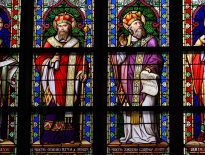The book “Proofs of God’s Existence” describes Richard Wurmbrand’s experience, who, in the dungeons of communist horrors, turned suffering into a very successful teacher of character and well-balanced words.
Richard Wurmbrand was born in Bucharest to a Jewish family. He was attracted to communism in his youth, an ideology that would later prove to be his greatest torturer. He later renounced Marxist doctrines and accepted the Messiah into his life, becoming pastor of the Lutheran Church in Bucharest.
Providence gave him an astral moment that revealed his true character. In the Congress of Cults—convened at the Palace of Parliament and chaired by Prime Minister Petru Groza— appalled by the willingness of religious leaders to cooperate with the communist dictatorship, Wurmbrand was the only dissonant voice against the totalitarian regime and co-religionists, who, like Caiaphas and Pilate, sold out Christ for their own good.
Through this gesture of sublime faith, Wurmbrand “[washed] away the shame on Christ’s face.” This is the turning point of his life, which made his path seemingly irreversible. On February 28, 1948, he was arrested by the authorities and imprisoned in the dungeons of communist horrors, in the “underground”, where he turned suffering into a very successful teacher of character and well-balanced words. In the midst of his suffering of over 14 years this apology of God’s existence was born.
Proofs of God’s existence and scientific reasoning
The kind of argument proposed by Wurmbrand was born of discussions with many atheists in the “quiet” underground, because “well-thought-out words are rooted in deep silence.” In his book, Wurmbrand calls for the removal of the “smoky goggles” in order not to fall into the trap of simplism even when it comes to God.
Cosmological, metaphysical, teleological, historical, moral, prophetic reasonings, arguments of probability, of thermodynamics, of heard prayers, and of faith, etc., are part of his argument. For the traditional Christian reader, the volume devoted to extrinsic arguments to the Bible can be a little uncomfortable. The book calls for the broadening of the cultural-scientific horizon of Christians so as not to fall into the trap of fundamentalism.
In the words of his compatriot Einstein, “coincidence is God’s way of remaining anonymous.” This statement applies well to Wurmbrand’s God, who leaves him in the clutches of the totalitarian regime to make Him known to intellectuals and ordinary people in prisons and to turn him into one of the greatest apologists of His existence and character. Richard Wurmbrand is probably the most translated Romanian author to date, his best-known work being “In God’s Underground”.
Daniel Niţulescu studied theology and obtained his doctorate in history at Babeș-Bolyai University. He is interested in the Protestant Reformation, the philosophy of sacred history, imagology, and the history of ideologies. Two volumes bear his signature: “The Reform between the Cross and the Crescent” and “Turkey—The Cradle of the Cross and the Crescent: The history of the cities of the Apocalypse from the perspective of ‘His Story'”.



















